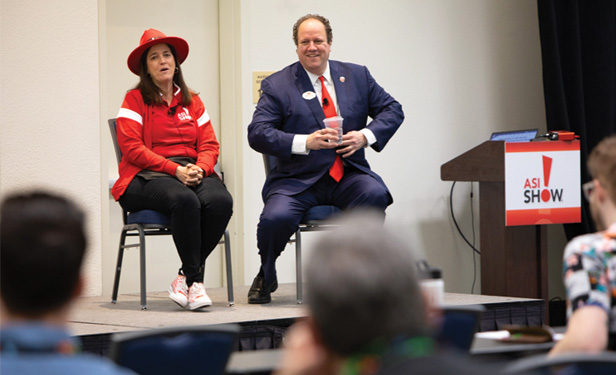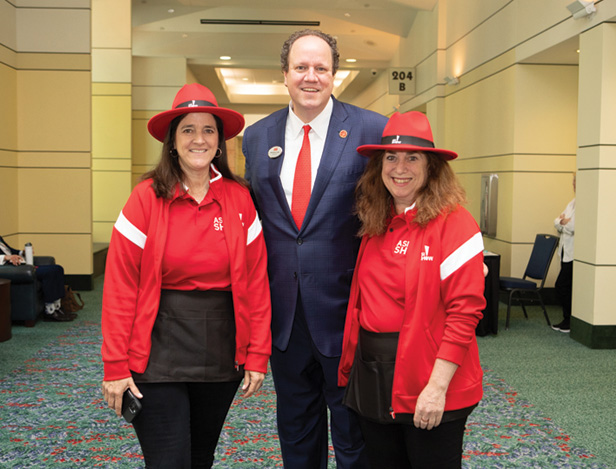March 05, 2024
ASI Fort Worth 2024: The Cohn Family Shares Their Secrets of Generational Success
ASI Chairman Norman Cohn and his children Matthew and Stephanie discussed stories and lessons learned from a decades-long legacy in promo during the Education Day session.
The rewards of a family business are so great that if you don’t enjoy it, you should do something else, said ASI Chairman Norman Cohn during a panel at the ASI Show Fort Worth.
He shared this philosophy during a brand-new session on Education Day – “3 Generations of ASI Success: The Cohn Family Business Secrets Revealed.” Also on the panel were Norman’s children – Stephanie Cohn Schaeffer, ASI corporate vice president, and Matthew Cohn, vice chairman at ASI – to share the stories and lessons they’ve learned being part of a family business spanning multiple generations. ASI has been in the family since Norman and his parents Maurice and Bess purchased the company in 1962.

(From left to right) An Education Day panel on family business success featured Stephanie Cohn Schaeffer, ASI corporate vice president, and Matthew Cohn, ASI vice chairman. Chairman Norman Cohn was unable to attend the show and called into the session. ASI Media’s Editor-in-Chief C.J. Mittica and ASI Marketing Manager Erin Rolo moderated the panel.
According to Stephanie, the Cohn family comprises 28 members, including five children and 11 grandchildren; most of the fourth generation have worked for the family business in some capacity, varying from interning over the summer to working the registration desk at ASI shows.
But contrary to what one might think, family members aren’t required to enter the business. In fact, Norman has prerequisites for those so inclined: they must graduate college with a B-average or better and must work elsewhere before joining ASI.
“The worst thing you can do is make your family feel like they must join your business, because if they feel they have to do that, they will never be happy,” said Norman, who was unable to attend the show and called into the session.
Stephanie said she worked as a teacher and then for a “horrible” supplier who jeopardized distributor relationships, before finally joining the family company.
Meanwhile, Matthew said he’s been involved in ASI since his high school and college days, working on early versions of launching ESP on a CD-ROM. After graduating college, he joined a consulting firm in Boston and then attended business school in Philadelphia. His senior project focused on a business turnaround presentation for a version of ESP used by a medical company that was doing quite poorly. “My dad said, gosh, this is a good plan. Come join us,” Matthew recalled. So, he did.
“The worst thing you can do is make your family feel like they must join your business, because if they feel they have to do that, they will never be happy.” Norman Cohn, ASI
Through working trade shows with her grandmother at a young age, Stephanie said she learned the value of how to treat customers and talk to people.
During a trade show in Philly, she said she remembered opening hundreds of cream cheese packets to spread over mini bagels and recalled her grandmother making sure customers ate hot dogs so that they had enough fuel before talking business. “I remember feeling like I belonged,” Stephanie said.
Having chosen the business of their own free will, the Cohn family has a shared vision of priorities and goals for their company.
“A family business means we care,” said Matthew. “We spend a lot of time thinking about how we can add value to help the industry prosper, help each of our customers do better and help overall success. We have many long-standing employees who feel like they’re part of our family. We are building long-term relationships, careers, experience and knowledge-sharing that help our members and our clients succeed.”

Stephanie Cohn Schaeffer (left) and Matthew Cohn were joined by their sister Debra, a lawyer who previously worked for ASI and sat in the audience during the session.
Both Cohn siblings state that they talk about the business at all hours, day or night, and at every celebration. But sometimes this can be a double-edged sword. “Unlike other people who can go home and not think about work for an hour, we’ve never been able to do that,” said Matthew. “Every celebration ends up with some aspect of ‘let’s talk about things.’”
Matthew and Stephanie drive to work every day, and Stephanie said she values the one-on-one time where they discuss the business. That’s where the “magic” of great ideas happens.
According to Matthew, another challenge that comes with the family business is establishing clear lines of authority and communication, an issue that can sometimes arise with non-family members of the company. “If you’re not constantly working on those lines of authority and responsibility, it’s going to be a mess,” he said. “Lack of clarity will lead employees to leave, as well as the family getting frustrated.”
To make sure their family business remains successful, the Cohns have long enlisted the help of consultant Dr. Steve Treat, CEO of Council for Relationships and a regular speaker at ASI Shows. The Cohns also hired a different consultant to work through next-generation aspects of the business and interview every member of the family to figure out what they want and how to engage further, Stephanie said.
Not everything has to be done the same way for every family member, she added: “We’re working hard for the future of our business, our employees and the industry. We want the next generation to feel the same passion as we do for the business, to love it like we love it.”
By investing in their relationships with each other, their customers and their employees, the Cohn family keeps their business alive, abreast of new technologies, and thriving.
“Believe in yourself, don’t settle and always do the right thing,” said Norman Cohn during the panel. “Eventually, with those rules in mind, you will have a business you can be proud of. If you’re not proud of your business, you shouldn’t be in it.”
